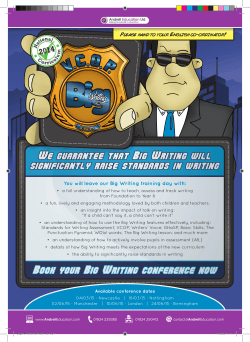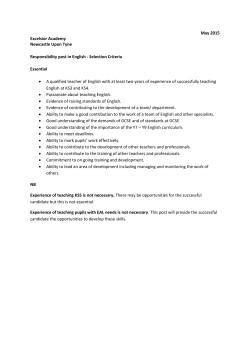
to an information sheet for phase 1a of the
think Active Designing for Health Information Booklet (Phase 1a, P, v2) You are invited to take part in a Newcastle University research project called Think Active. We would like to talk to you about your experiences of living with memory problems. If you are interested in taking part, then please consider the information in this booklet carefully. You can discuss it with others to help you decide whether to take part. Your healthcare will not be affected whatever you decide to do. If you have any questions then please call Lizzie Dutton on 033 33 444 034 (local rate number) or email e.m.dutton@newcastle.ac.uk. Need a large print or audio version? ( 033 33 444 034 (local rate number) www.movelab.org.uk/thinkactive Think Active Information Sheet (Phase 1a, P, Version 2, 31/03/15) Page 1 of 8 What is this research about? Researchers have found that being physically active is beneficial for people with memory problems. Physical activity includes everyday things like gardening, shopping, walking or swimming. The aim of the Think Active research project is to design new services that help people to be physically active. Up to 84 participants will take part in this research. Can you help us? If you have a diagnosed memory problem then we would like to talk with you. We are keen to know about the activities you enjoy doing. We want to know if memory problems affect your activities. By sharing your experiences you will help us to design new services. If you live with someone they can also take part, if you both agree to this. Think Active Information Sheet (Phase 1a, P, Version 2, 31/03/15) Page 2 of 8 What will I have to do? If you decide to take part in this research then a researcher will arrange the following activities with you: Introduction. 1 hour The researcher will come to your house or meet you at a place where you feel comfortable. She will ask you some questions about yourself. She will then give you a diary to complete over the following week. Diary. Around 40 minutes on 6 days. The diary will ask you to record the activities you do each day for 6 days. It will include some more creative activities, such as drawing a picture or writing about your ideal day out. These activities are optional. We have included them because we want to know what people like to do and what interests them. We also want the diary to be enjoyable for you to complete. Interview. 1 hour After 2 weeks, the researcher will arrange to come to your house again. Think Active Information Sheet (Phase 1a, P, Version 2, 31/03/15) Page 3 of 8 She will ask you about the events and ideas that you recorded in the diary. She will also ask you about your experiences of physical activity in general. All of these activities are voluntary. Will the research benefit me? It is unlikely that taking part will help you directly. However, many people enjoy talking to researchers about their experiences. Your ideas will help us to create new products and services for people with memory problems. To thank you for your time we will give you £50 worth of shopping vouchers after the second interview. Are there any risks? The researcher will ask you about your experiences of having memory problems. Some people may find this upsetting. But, you do not have to talk about anything you are not comfortable with. You can also stop taking part at any time. Think Active Information Sheet (Phase 1a, P, Version 2, 31/03/15) Page 4 of 8 How can I take part? To take part or to find out more, please call Lizzie Dutton on 033 33 444 034 (local rate number). You can ask the researcher questions. She will also ask you some questions. We may not be able to interview everybody. If you want to take part then the researcher will arrange a time to come to your home or a place you would like to meet. When you meet the researcher she will discuss a consent form with you. It will be your decision whether or not to take part. You can withdraw from the research at any point. You do not have to give a reason. You will not be penalised for withdrawing. It will not affect any care you receive. If we think that the research is not suitable for you at any point then you may be withdrawn. Think Active Information Sheet (Phase 1a, P, Version 2, 31/03/15) Page 5 of 8 What will happen to my data? We will ask you for your contact details. These will only be used to contact you about the Think Active research project. We would like to audio record the interview conversations. We will store the recordings securely. When we write up the conversations we will change your name and personal details so that you cannot be recognised. We might use your words in research publications but your personal details will not be included. The researcher will ask you if you are happy for photos to be taken during the research. Photos will be kept securely. We may use the photos in publications, with your consent. If we use photos we will change them so that you cannot be recognised. The project’s researchers will have access to your data along with regulatory authorities and the NHS Trust who may access your data to check whether the research is being done correctly. At all times your data will be secure and remain confidential. Think Active Information Sheet (Phase 1a, P, Version 2, 31/03/15) Page 6 of 8 Who is organising the research? ThinkActive is a Newcastle University student research project that will be written up and submitted for a PhD. The research is funded by Philips and the Engineering and Physical Sciences Research Council. The research is sponsored by The Newcastle upon Tyne Hospitals NHS Foundation Trust. The research is not directly linked to the NHS Memory Assessment Service or any GP services. The South West – Exeter Research Ethics Committee has approved this research. Researchers will not receive payment for your recruitment or participation. Thank you Thank you for reading this information. If you would like to take part in this research then please call us. We are happy to answer any questions you have. Think Active Information Sheet (Phase 1a, P, Version 2, 31/03/15) Page 7 of 8 Get in touch… Primary researcher: Lizzie Dutton ( 033 33 444 034 (local rate number) @ e.m.dutton@ncl.ac.uk www.movelab.org/thinkactive MoveLab, 4th Floor William Leech Building, The Medical School, Newcastle University, Newcastle upon Tyne, NE2 4HH Need help? If you experience negative feelings or concerns about your health then you can call the Alzheimer’s Society on: 0300 222 11 22 (local rate number) They help people with many different types of memory problems. They also help people who support those with memory problems. Alternative contacts for support and help: Your GP (doctor) Age UK: 0800 169 6565 (normally free from landlines) The Samaritans: 08457 90 90 90 Concerns or complaints If you have any concerns about this research you should contact Professor Mike Trenell: Phone: 0191 208 6935 Email: michael.trenell@ncl.ac.uk Post: MoveLab, 4th Floor William Leech Building, The Medical School, Newcastle University, Newcastle upon Tyne, NE2 4HH If you remain unhappy you can contact the Patient Relations Department: Phone: 0191 223 1382 or 0191 223 1454 Email: patient.relations@nuth.nhs.uk Think Active Information Sheet (Phase 1a, P, Version 2, 31/03/15) Page 8 of 8
© Copyright 2025










